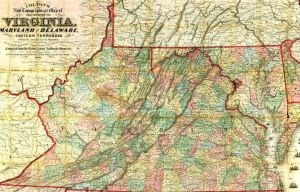 Today in the Battle of Cool Springs, Virginia, a still-retreating Confederate Lt. General Jubal Early, following an unsuccessful attempt to invade Washington, D.C., is confronted by a contingent of Union forces. Significantly outnumbering the Federals by some 8,000 to5 5,000, the Rebels engage their foes for two days. While the Union loses this battle,the Federals put up a spirited fight, suffer relatively few casualties, and force the Confederates to withdraw from the battlefield and retreat yet further southward.
Today in the Battle of Cool Springs, Virginia, a still-retreating Confederate Lt. General Jubal Early, following an unsuccessful attempt to invade Washington, D.C., is confronted by a contingent of Union forces. Significantly outnumbering the Federals by some 8,000 to5 5,000, the Rebels engage their foes for two days. While the Union loses this battle,the Federals put up a spirited fight, suffer relatively few casualties, and force the Confederates to withdraw from the battlefield and retreat yet further southward.
As is so often the case, even when winning a minor battle or skirmish Confederate victories this year rarely result in gained ground. The Union armies, in entirety far more powerful and more heavily manned than the armies of the South, by now have such an advantage that defeats such as Cool Springs are readily absorbed.
Union officer Colonel Joseph Thoburn, reflecting the reality of superior Union forces and voicing accolades for his own tactics and skills in this battle, writes his side of the story the day after the Confederates withdraw from the battlefield:
…. Our loss was comparatively light considering the character of the contest which was very stubborn and determined. The men were protected by the embankment of a road that ran along the river bank and under a large bluff. The total killed and wounded will not exceed perhaps 200. The loss of the enemy is much greater, probably three times as much. We are resting today very quietly. The 6th Army Corps and a portion of the 19th is here. No attempt is being made to cross again to the other aide of the river. What the enemy is doing, we know not….
Far to the West this day young Missouri Baptist pastor Jonathan B. Fuller writes a letter from Kansas City to his father back East. As is almost inevitable in letters during the war years, the great conflict is one of the subjects of which Fuller touches upon. The Young pastor is a Union man serving in an area of the country still torn asunder by differing loyalties.
…. We have had wars and rumors of wars across the river to deversify the monotony during the past week. A good many killed–a great many scared–and an unpleasant row generally. Our troops have been over–but are now I believe home again[.] Some say that Platte City[,] some twenty five miles above has been burned to the ground by our soldiers–others say it has been only partially destroyed[.] I think the latter supposition the most probable. I do not think there is any real danger from bushwhackers here–if any mischief happens it will be caused by a collision of the political factions of the place. I trust however that nothing of the kind may take place.
In the meanwhile I am preaching away to the game congregations[.] No change as yet I believe for better or for worse. But I am looking forward with much anxiety and some dread to the Fast day services of Aug. 4th. I am afraid that my congregation may split upon that rock. I fear that even the utmost mildness and christian charity of my utterance will not save me, from offending some one’s sensitiveness. But I suppose there is nothing for it but to speak out and take the risks. If things blow up badly I must just resign I suppose and come home….
At least young Fuller has a home to go to if the going gets too rough. Hundreds of thousands of dead soldiers, by this date, will never return home.
Sources: Battle of Cool Springs (link) and (link); Scott C. Patchan, “The Battle of Cool Spring, July 18, 1864: Perspective of Col. Joseph Thoburn, Commander of U.S. Forces on the Ground,” Shenandoah 1864 (link); Jonathan B. Fuller, “From Jonathan B. Fuller to Dear Father,” July 18, 1864, in “Civil War on the Western Border” by The State Historical Society of Missouri Research Center-Kansas City (link)


